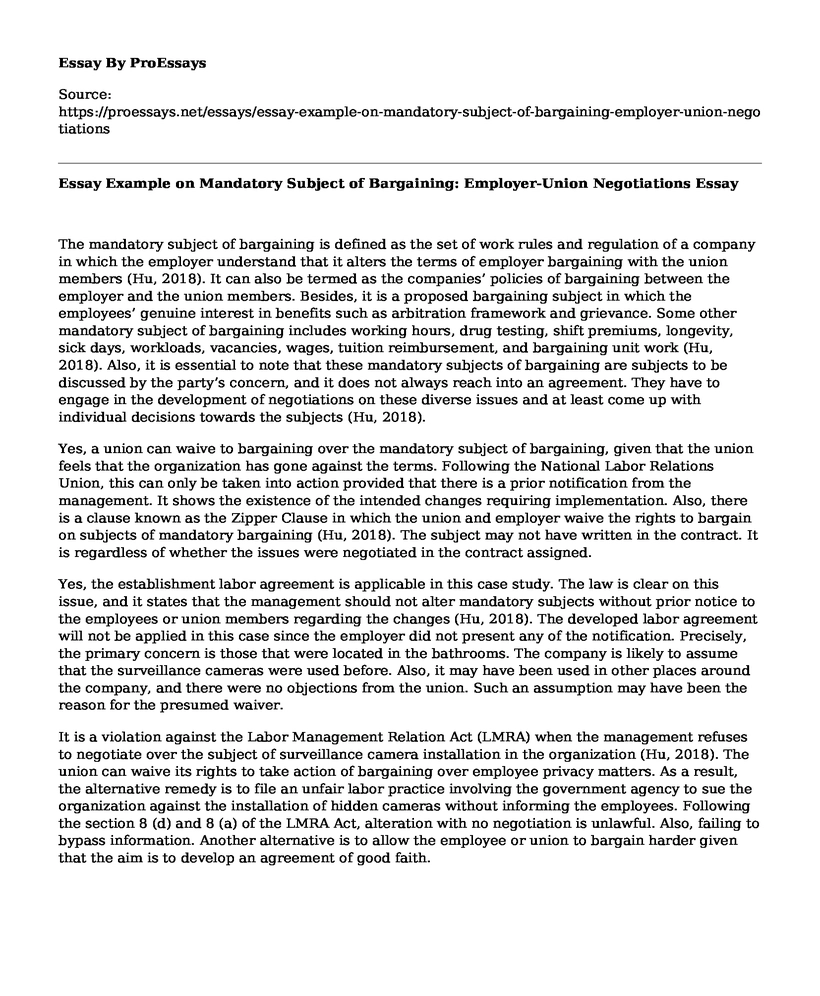The mandatory subject of bargaining is defined as the set of work rules and regulation of a company in which the employer understand that it alters the terms of employer bargaining with the union members (Hu, 2018). It can also be termed as the companies’ policies of bargaining between the employer and the union members. Besides, it is a proposed bargaining subject in which the employees’ genuine interest in benefits such as arbitration framework and grievance. Some other mandatory subject of bargaining includes working hours, drug testing, shift premiums, longevity, sick days, workloads, vacancies, wages, tuition reimbursement, and bargaining unit work (Hu, 2018). Also, it is essential to note that these mandatory subjects of bargaining are subjects to be discussed by the party’s concern, and it does not always reach into an agreement. They have to engage in the development of negotiations on these diverse issues and at least come up with individual decisions towards the subjects (Hu, 2018).
Yes, a union can waive to bargaining over the mandatory subject of bargaining, given that the union feels that the organization has gone against the terms. Following the National Labor Relations Union, this can only be taken into action provided that there is a prior notification from the management. It shows the existence of the intended changes requiring implementation. Also, there is a clause known as the Zipper Clause in which the union and employer waive the rights to bargain on subjects of mandatory bargaining (Hu, 2018). The subject may not have written in the contract. It is regardless of whether the issues were negotiated in the contract assigned.
Yes, the establishment labor agreement is applicable in this case study. The law is clear on this issue, and it states that the management should not alter mandatory subjects without prior notice to the employees or union members regarding the changes (Hu, 2018). The developed labor agreement will not be applied in this case since the employer did not present any of the notification. Precisely, the primary concern is those that were located in the bathrooms. The company is likely to assume that the surveillance cameras were used before. Also, it may have been used in other places around the company, and there were no objections from the union. Such an assumption may have been the reason for the presumed waiver.
It is a violation against the Labor Management Relation Act (LMRA) when the management refuses to negotiate over the subject of surveillance camera installation in the organization (Hu, 2018). The union can waive its rights to take action of bargaining over employee privacy matters. As a result, the alternative remedy is to file an unfair labor practice involving the government agency to sue the organization against the installation of hidden cameras without informing the employees. Following the section 8 (d) and 8 (a) of the LMRA Act, alteration with no negotiation is unlawful. Also, failing to bypass information. Another alternative is to allow the employee or union to bargain harder given that the aim is to develop an agreement of good faith.
Conclusion
The merits of the party’s respective position are that the cameras promote the security of employee privacy concerning the threats of surveillance. Such cases would have been considered with prior notification to preserve employee privacy (Hu, 2018). However, the installation of surveillance cameras protects the interest of ownership of the business, and providing information to the union and employees will reduce the effectiveness of the cameras significantly. The union has power in its position because this case has gone against the responsibility to negotiate in good terms. They can ask the employer to go for a negotiation table and arrive at a plan to compensate for the breached mandatory subject.
Reference
Hu, X. (2018). Equality of bargaining power in contracts for international liner shipping. WMU Journal of Maritime Affairs, 17, 347-375. https://doi.org/10.1007/s13437-018-0152-5
Cite this page
Essay Example on Mandatory Subject of Bargaining: Employer-Union Negotiations. (2023, Aug 08). Retrieved from https://proessays.net/essays/essay-example-on-mandatory-subject-of-bargaining-employer-union-negotiations
If you are the original author of this essay and no longer wish to have it published on the ProEssays website, please click below to request its removal:
- Movement in the Exchange Rate Between the Chinese Yuan and the US Dollar
- Industrial Health Hazards and Sampling Techniques Paper Example
- Effects of a Nuclear-Powered World Essay Example
- What Should Ray Include in His Job Description for the Director of Engineering Position? - Essay Sample
- Essay Example on Pursuing Your Dream Career: The Role of Passion and Pragmatism
- Paper Example on GM Strike: UAW Seeks Better Pay, Improved Working Conditions
- Essay Example on Cultural Diversity in the Workplace: Benefits and Challenges







